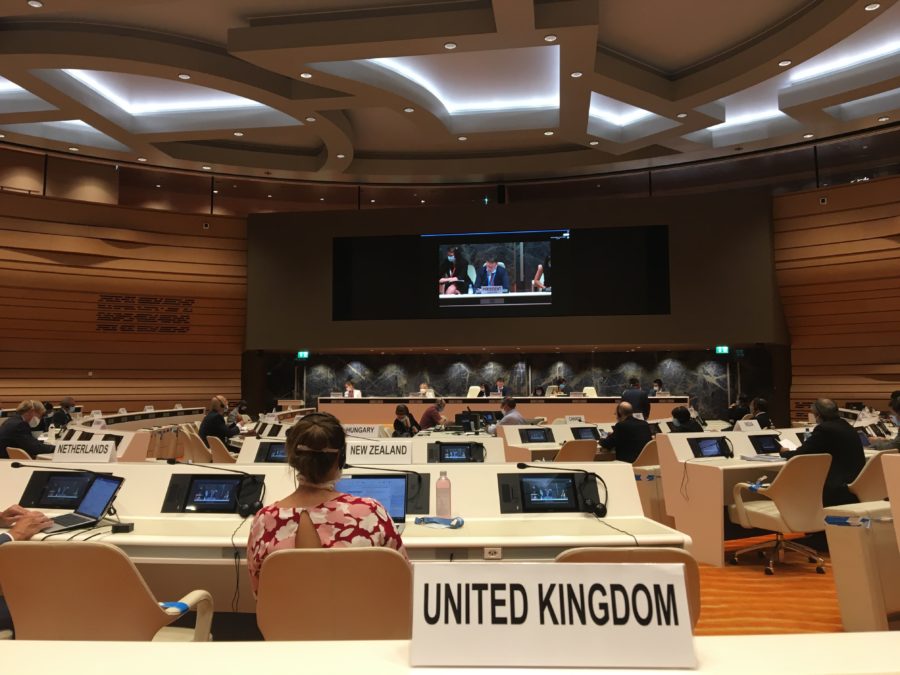UK Ambassador and Permanent Representative to the Conference on Disarmament
Part of Conference on Disarmament
7th July 2020 Geneva, Switzerland
Disarmament blog: what’s the point of the Conference on Disarmament? 
The Conference on Disarmament resumed its 2020 session on Tuesday, after a break of 122 days. (We had been supposed to meet a week earlier, but technical problems with the new remote participation platform meant the meeting was cancelled at the eleventh hour.) But did anyone miss the CD while it was silent? Should it just have stayed that way?
First, the case against. While the track record of the CD and its predecessors include the three main WMD treaties, amongst others, it hasn’t launched a new negotiation since the CTBT was concluded in 1996. Every disarmament treaty since then – the prohibitions on land mines and cluster munitions, the Arms Trade Treaty, and, yes, the TPNW – has been negotiated elsewhere. Far from fulfilling its mandate as “the single multilateral disarmament negotiating body”, it has become a talking shop, unable even to agree a programme of work due to great power rivalry, a tangle of linkages between different countries’ priority issues, and a crippling lack of political will.
Every diplomat who’s spent any time in the CD in the last 25 years shares the frustration that lies behind that line of attack. But no-one goes into disarmament diplomacy because it’s easy. The simple fact is that if the CD didn’t exist, we’d have to invent it. We can’t meaningfully negotiate nuclear disarmament anywhere else: it includes all the nuclear possessor states (unlike the NPT) and operates by consensus (unlike the UN General Assembly), giving states the assurance that their security bottom lines will be protected. It seems highly unlikely that in today’s environment we’d be able to agree on a better body. When the political window to negotiate disarmament treaties reopens, we won’t want to waste time setting up a new body to do it.
There’s also an important side-effect of the CD, which is that it acts as a centre of gravity for the disarmament ecosystem in Geneva. As it sits for 24 weeks a year it needs a resident community of disarmament diplomats to service it. But while they’re here, those diplomats also cover the other Geneva-based disarmament instruments (such the BWC and conventional weapons treaties), and work with other delegations and NGOs who also form part of the ecosystem. That builds a community of disarmament experts who can exchange ideas, inject new thinking into policy debates in capitals, and quietly and informally test proposals. No other city in the world has that, and if the CD didn’t exist, Geneva wouldn’t either.
Even if it isn’t negotiating treaties, that community of experts can still do the essential ground work for when it is eventually able to do so. During what looked like the deadlock of the 1970s and 80s, the CD was doing the painstaking technical work on how to verify a nuclear test ban. That looked far-fetched and esoteric work then; after 1994, when it suddenly became politically feasible, the CD was ready to conclude the formal negotiations within only two years.
But we can and must do this job better. We can all show greater creativity, flexibility and restraint. We can put aside our talking points and listen to each other, in an effort to find points of common ground that we can build out from. Those who insist that the CD can’t do anything except formally negotiating draft treaties don’t protect the CD’s mandate, as they claim, but undermine its value and the reason for its existence.
The consultation exercise carried out by the Australian Presidency, while they were unable to convene meetings, demonstrated that wide differences remain on the big issues. That’s to be expected. But it also showed the majority want to use this body to its full potential: to do the technical work that would underpin future treaties, to understand each other’s positions in depth, and perhaps even to negotiate measures other than treaties that could start to build up norms and enhance common ground. If we can do that, we’ll have a head start when the window of political opportunity opens again.









